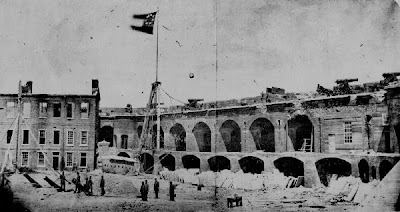
The stand-off at Ft Sumter had begun in December 1860 after South Carolina declared it's secession from the Union. Major Robert Anderson of the US Army had immediately occupied the fort, and the South Carolinians demanded he withdraw.
In January 1861, the North sent a ship with reinforcements, but the South refused to let it enter the harbor and even fired upon it without casualties.
By April, Major Anderson was running low on supplies and told his superiors he would soon have to surrender if help did not arrive. But the Southerners could wait no longer.
April 12, 1861 . . . At 4:30 am, SC militia forces, which consist of some 5,000 men under the command of General P.G.T. Beauregard, open fire on the Federal forces occupying Ft.Sumter and begin the Civil War. The first shot lands on the fort's parade ground. The first answering shot from Sumter came at 7:30 am. Due to limited ammunition and manpower, and the danger of SC shelling, only a few of Sumter's guns were able to be used by Anderson. About 1:00 pm three ships of a relief force arrived, but were unable to do anything but watch. During the night Sumter's guns fell silent and the South Carolinians fired only sporadically.
April 13, 1861 . . . By the second day South Carolina shelling had begun to set the buildings inside the fort on fire. At 1:30 pm the flagstaff was shot off, though a sergeant bravely re-erected it. Anderson was now short of food, short of ammunition, and the fort was aflame. At 2:30 pm, after a 34 hour cannonade, Maj. Anderson was forced to surrender. Even though 4,000 shells had been fired at the fort and 1,000 sent back by the defenders, there had been no casualties in this battle.
April 14, 1861 . . . During surrender ceremonies at noon an accidental powder explosion on the 50th round of a 100 gun salute killed Pvt Daniel Hough, mortally wounded Pvt Edward Galloway, and injured four others. The war had begun and blood shed. The injured men were taken to a Charleston hospital, and Maj. Anderson and his command were allowed to board one of the Federal ships and sail to New York, where he was given a hero's welcome.

(Ft Sumter after it's capture )
The action at Ft Sumter ignited a powder keg. Both Northerners and Southerners reacted with wild enthusiasm. Nearly everyone wanted this war. They welcomed it. The social differences between North and South had been building to a conflict for decades, and now it would be resolved once and for all.
April 15, 1861 . . . President Lincoln issues a proclamation for the states to raise 75,000 militia to suppress the rebellion.
April 15, 1861 . . . President Lincoln issues a proclamation for the states to raise 75,000 militia to suppress the rebellion.
No comments:
Post a Comment